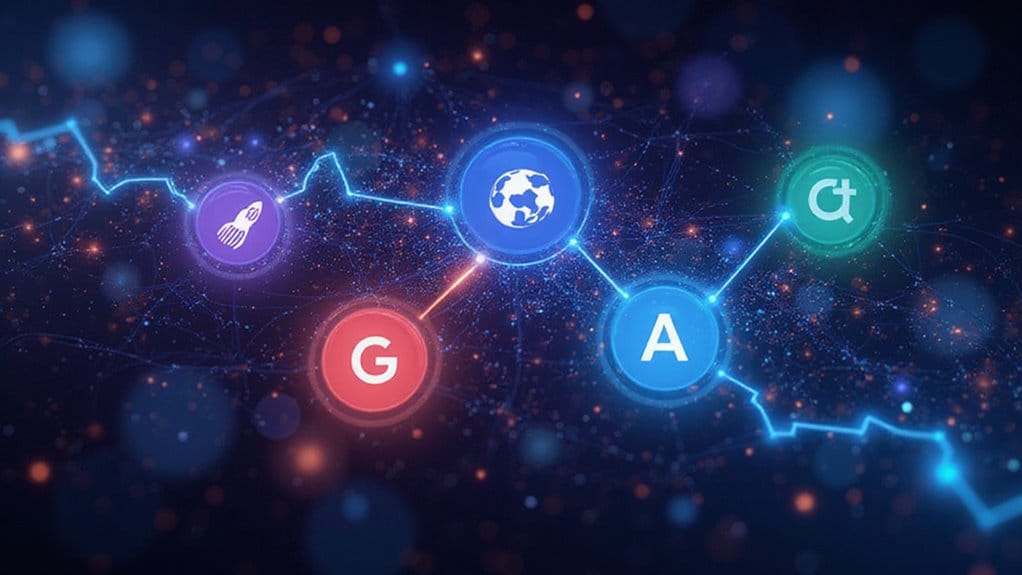AI is here, and it’s time to embrace it! Start by brushing up on your basic math and programming skills—Python is your best friend here. Scared? Don’t be! Numerous online courses can guide you through. Understand the difference between narrow AI, which is everywhere, and general AI, which is still a dream. Stay sharp on ethical issues, too; it’s essential! So, roll up your sleeves, and discover the game-changing potential of AI—there’s much more to uncover!

Artificial intelligence, or AI for short, can seem like a mysterious, far-off domain reserved for tech wizards and sci-fi movies. But guess what? It’s not that complicated, and you can start your journey today!
First, let’s squash some common AI misconceptions. No, robots are not plotting to take over the world. Instead, AI involves creating computer systems that can perform tasks requiring human intelligence, like understanding speech or recognizing images.
Let’s debunk AI myths: it’s not about world domination; it’s about enabling computers to think like us!
Now, let’s examine the types of AI. There’s narrow AI, designed for specific tasks, and the more ambitious general AI, which is still largely theoretical. You’ll encounter terms like machine learning and deep learning, which are all about teaching computers to learn from data. Narrow AI is the most prevalent type currently in use, making it essential to focus on its applications as you learn. Explore these concepts, and you’ll see how they can transform industries like healthcare and transportation!
Next, you need to grasp how AI works. It’s all about algorithms and models analyzing data. Think of it as giving your computer superpowers! Familiarize yourself with neural networks, which mimic the human brain, and natural language processing (NLP), which helps machines understand us humans. AI systems improve performance over time through data interaction, making them increasingly valuable. In fact, machine learning algorithms are a key component that enables AI to identify patterns and make predictions.
So, how do you get started? First, brush up on basic math and programming skills—Python is a fantastic language for beginners. Platforms like Coursera offer excellent courses to guide you. And remember, continuous learning is essential!
As you explore AI, don’t forget about the ethical considerations. AI ethics are significant, ensuring that technology serves humanity rather than harms it. You’ll want to stay informed about these issues as you investigate deeper.
Finally, don’t hesitate to use AI tools like TensorFlow and Keras to bring your ideas to life. The world is waiting for your brilliance, so step into the AI arena and make your mark!
Frequently Asked Questions
What Are the Ethical Concerns Surrounding AI Development?
Ethical concerns in AI development are no joke.
Think bias mitigation—ensuring algorithms don’t unfairly target certain groups.
Then there’s accountability frameworks; without them, who’s responsible when things go wrong?
Regular audits are crucial, as is using diverse training data—because a one-size-fits-all approach doesn’t cut it.
Users deserve transparency, so don’t hide behind complex jargon.
The stakes are high; ethical AI isn’t just a trend, it’s an absolute necessity for our future.
How Can AI Impact Job Markets in the Future?
AI will dramatically reshape job markets, leading to substantial AI job displacement.
Expect major industries to transform, with automation replacing many roles—especially in manufacturing and retail.
But don’t panic! New AI employment opportunities will emerge, requiring workers to embrace AI skill requirements.
Adapt or get left behind! Upskill now, learn about AI tools, and develop those soft skills.
What Programming Languages Are Best for AI Beginners?
For beginners diving into AI, Python basics are a must. Why? Its simplicity and rich libraries make learning a breeze.
Don’t overlook JavaScript frameworks, which are perfect for web-based projects. Start with Python to grasp fundamental concepts, then explore JavaScript for interactive applications.
Are There Any Free Resources to Learn AI?
For those enthusiastic to plunge into AI, free resources abound!
Explore online courses like IBM’s SkillsBuild and Elements of AI. They’re designed to simplify complex concepts.
Don’t forget educational videos on platforms like Google’s AI Education.
Get practical by using coding tools like TensorFlow and Google Colab.
Seriously, skip the paid stuff and start here. The world of AI is vast—don’t miss out on these treasures!
Your future self will thank you.
How Do I Stay Updated With AI Advancements?
To stay updated with AI advancements, subscribe to AI newsletters for the latest insights—yes, they actually exist!
Engage in online forums for discussions and tips. Follow industry leaders on social media; it’s a goldmine of information.
Don’t skip research publications; they’re packed with breakthroughs.
Attend industry conferences and educational webinars to network and learn.









